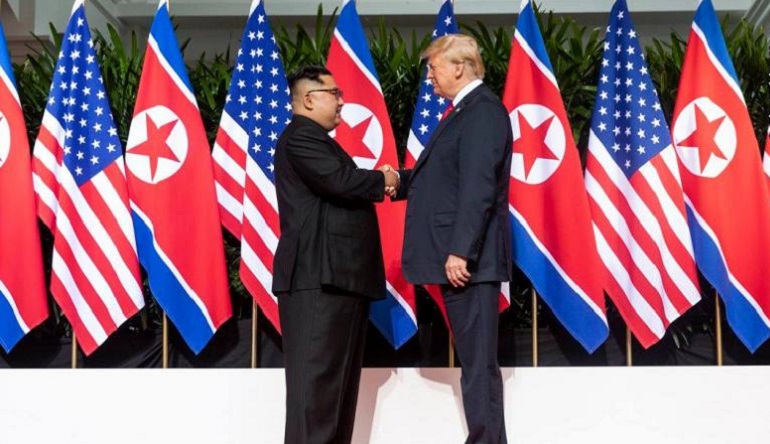The U.S., North Korea, and Nuclear Diplomacy
Author: Daniel Wertz
Last Updated October 2018 (Previous Edition: November 2015)
 President Donald Trump meets with North Korean leader Kim Jong Un in Singapore. Photo via White House.
President Donald Trump meets with North Korean leader Kim Jong Un in Singapore. Photo via White House.
Introduction
For three decades, North Korea’s pursuit of a nuclear arsenal has been the predominant U.S. foreign policy concern on the Korean Peninsula, threatening both regional stability and the global nonproliferation regime. Although multiple countries have a major stake in the issue, the U.S. has been both the most important interlocutor in attempts to resolve it diplomatically and the leader in global efforts to pressure and isolate North Korea. Efforts to address North Korea’s nuclear weapons program through various combinations of diplomacy and pressure have at times slowed or temporarily halted Pyongyang’s progress, but have failed to roll it back or to fundamentally change the dynamics of conflict on the Peninsula.
As North Korea has dramatically accelerated the pace of progress in building its nuclear program in recent years, and as the Trump administration has alternately leveled threats of military action and engaged in high-profile summitry with Kim Jong-un, this issue has risen to the top of the U.S. foreign policy agenda. The current round of U.S. diplomatic engagement with North Korea may hold enormous consequences for the future of the Korean Peninsula, perhaps leading to the denouement of this long saga – or, despite the high stakes, perhaps simply to another round of all sides “muddling through” with no ultimate resolution in sight. The Trump administration has framed negotiations with North Korea in stark binary terms – either leading to North Korea’s denuclearization and prosperity, or to a more intensified confrontation and conflict – but few experts expect North Korea to give up its nuclear arsenal any time soon.
This Issue Brief will review the history of U.S. nuclear negotiations with North Korea, taking a close look at past efforts to realize the denuclearization of the Korean Peninsula. It will also examine the persistent questions and themes surrounding how the U.S. has approached the issue of negotiating with Pyongyang, and how foreign analysts have perceived the motivations behind North Korea’s nuclear program.
DOWNLOAD PDF,
OR READ ONLINE HERE
NCNK
THE NATIONAL COMMITTEE ON NORTH KOREA
ABOUT
The National Committee on North Korea (NCNK) is a non-governmental organization of persons with significant and diverse expertise related to the Democratic People’s Republic of Korea. NCNK and its members support principled engagement with North Korea as a means to promote peace and security on the Korean Peninsula and to improve the lives of the people of North Korea. NCNK also works to provide policymakers, the academic and think tank community, and the general public with substantive and balanced information about developments in North Korea. NCNK was founded by Mercy Corps, a global aid and development organization, in 2004.
No comments:
Post a Comment